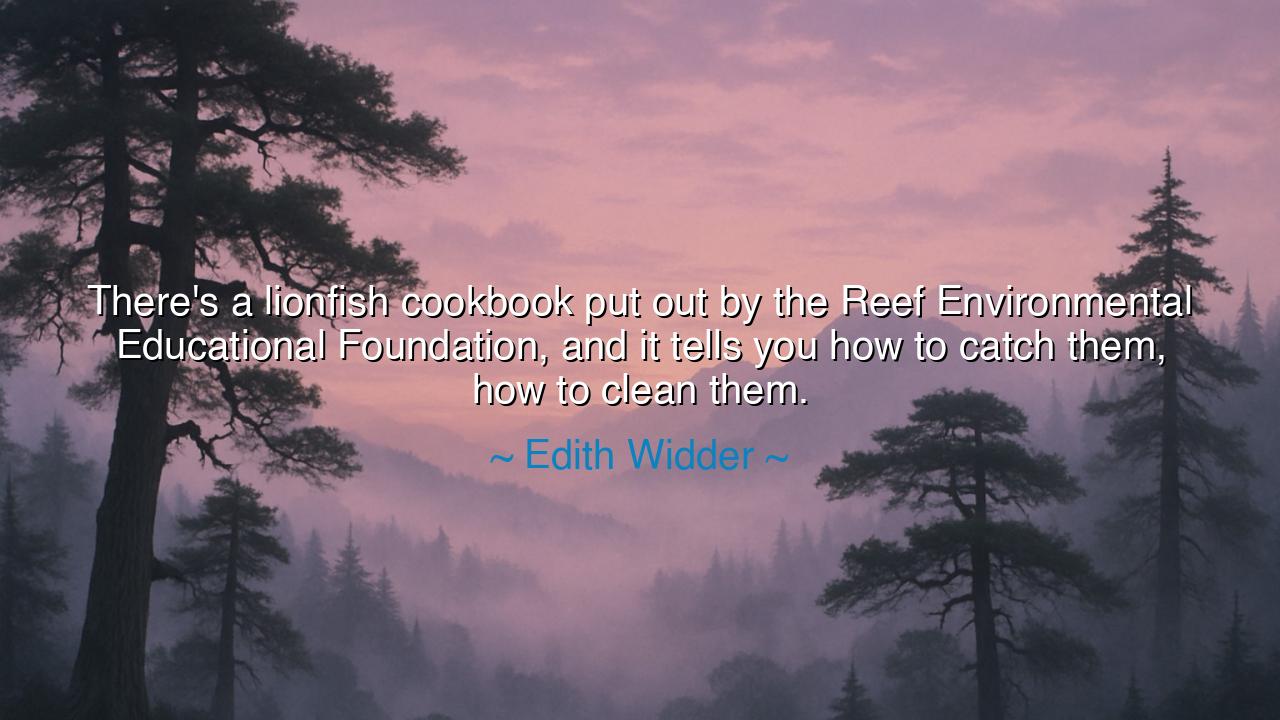
There's a lionfish cookbook put out by the Reef Environmental
There's a lionfish cookbook put out by the Reef Environmental Educational Foundation, and it tells you how to catch them, how to clean them.






When h Widder, the oceanographer and deep-sea explorer, remarked, “There’s a lionfish cookbook put out by the Reef Environmental Educational Foundation, and it tells you how to catch them, how to clean them,” she was not simply speaking of recipes — she was speaking of redemption through knowledge. Her words carry a current of deeper meaning: that even from destruction, life may be restored; that wisdom is not only in study, but in action, in turning harm into sustenance, and threat into nourishment. Beneath the humor of her tone lies the ancient philosophy of balance — that humanity, having disrupted the harmony of nature, must now learn to live within its rhythms again.
The origin of this statement lies in the modern ecological struggle against the lionfish, a beautiful yet deadly invader of the Atlantic and Caribbean seas. Native to the Indo-Pacific, the lionfish was introduced, perhaps by human carelessness, into waters where it had no natural predator. Its population exploded, devouring smaller fish and devastating coral reef ecosystems. Scientists, divers, and conservationists sought ways to fight back — not with poison or war, but with ingenuity. Thus arose the lionfish cookbook, a symbol of turning defense into creativity, destruction into nourishment. It teaches not only the craft of cooking, but the deeper art of restoration through participation.
Widder, a woman of the sea, understood that saving the ocean requires more than science — it requires culture, and the reshaping of human habit. Her words reflect the wisdom that the ancients knew well: that nature and humanity are bound in a cycle of cause and consequence. When one takes too much, balance must be restored not through punishment, but through conscious adaptation. Just as ancient farmers once learned to rotate their crops to heal the soil, so too must modern humanity learn to adapt its appetites to heal the sea. The cookbook, then, is more than a manual — it is a parable of responsibility.
History holds many such examples of turning threat into triumph. Consider the story of Australia’s rabbit plague in the 19th century. Introduced by settlers, rabbits multiplied beyond measure, devouring crops and ruining land. But the people learned to survive by adjusting their relationship with the pest: they hunted, exported, and even developed new cuisines around rabbit meat. In the same way, the lionfish movement transforms fear into opportunity — it teaches that we can face invasion not merely by resistance, but by integration with purpose. This is an act of both ecological and moral wisdom — the reclaiming of balance through understanding rather than rage.
Widder’s words also speak of humility. For the lionfish’s presence in foreign waters is not its sin, but ours. It is humanity who, through negligence, allowed imbalance to enter. And yet, in acknowledging this truth, we are offered redemption — not through despair, but through action. The act of catching and cooking lionfish becomes an offering to the Earth, a ritual of making right what was once wrong. Just as a blacksmith reshapes broken iron into tools of use, so too can humankind reshape its mistakes into instruments of healing.
There is, too, a quiet poetry in the idea that a cookbook — a humble collection of recipes — can become a weapon of restoration. It reminds us that salvation often comes not from grand declarations, but from simple deeds done with awareness. To prepare a meal from the sea’s invader is to participate in the healing of creation, one plate at a time. It is to take part in the ancient dance of give and take, in which every act of nourishment is also an act of gratitude.
The lesson of h Widder’s reflection is profound: when faced with imbalance, do not despair — transform. The world’s wounds will not be healed by denial, nor by wrath, but by wisdom, patience, and creative love. Whether the lionfish, the forest fire, or the poisoned stream — each challenge offers a lesson in adaptation. Humanity must learn again the forgotten art of listening to the Earth, of turning harm into harmony.
So let this teaching pass to those who follow: make of your mistakes a feast for renewal. When you encounter destruction, seek the way to remake it into life. When you see chaos, bring it to order through understanding. As h Widder reminds us, even in the depths of the sea — where beauty and danger entwine — there lies a chance for transformation. And those who learn to turn the poisonous into the nourishing will not only feed themselves, but also help restore the sacred balance of the world.






AAdministratorAdministrator
Welcome, honored guests. Please leave a comment, we will respond soon